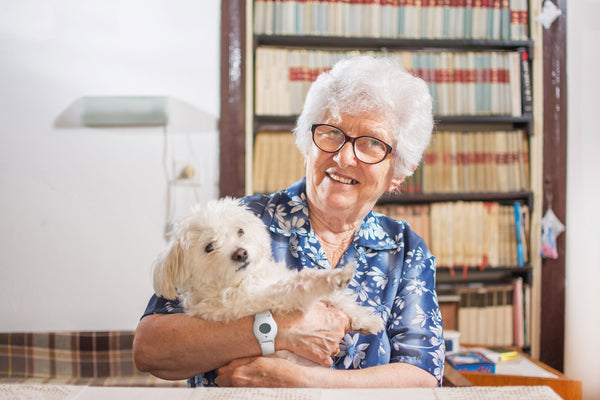Living Your Best Life
Helping Seniors Remain Independent

Do you or your senior loved one want to continue living independently and still practice safe measures? For most people, maintaining one's independence is crucial. While the aging process can pose challenges when living independently, seniors still prioritize independence and value autonomy over their own lives.
Read below to learn more about senior independence, why living alone is still so important for older adults, and what type of programs and devices can help seniors who want to continue living by themselves safely.
Why Is Independence So Important For Seniors?
Seniors choosing to stay at home independently is extremely important to them and should be supported for their health and well-being. Maintaining independence even in the later stages in life promotes:
- Success
- Confidence
- Happiness
- Sense of accomplishment
Allowing seniors to maintain independence can also boost their self-worth. Senior autonomy is so important that entire movements (and the month of February) are dedicated to empowering seniors living alone. These operations were established to endorse complete control in making their own decisions and encourage changes in the home if need be to improve their quality of life. Here are a few precautionary measures for seniors choosing to live safely at home.
Safety In The Home
There are many things you can do in the home to optimize safety. Here is a home safety checklist to use as a starting point to help seniors from potentially life-threatening situations and to promote safe, independent living.
Clean and Organize.
Having a tidy home can not only help prevent respiratory infections, but can also help prevent devastating injuries. Decluttering the home can free up space and help ease mobility. Keeping the home clean and organized can also allow easy access to medical equipment such as wheelchairs, oxygen tanks, nebulizer stations, etc.
Install Handrails
Installing handrails or grip bars in restrooms and showers is ideal for older adults. Slips and falls are very common in these areas. Handrails in hallways and on staircases can also help prevent senior falls. Non-slip mats should be used, and proper rug placement – free from bundled up areas - should be implemented.
Ensure Adequate Lighting
Adequate lighting can increase the visibility of furniture and other objects to prevent bumps and falls. This includes well-lit hallways, nightlights, and closet lights.
Stay Active!
While regular physical activity can promote independence by keeping the muscles strong, maintaining healthy daily routines can be equally important. Wholesome daily routines facilitate mental wellness, which directly affects physical health. Check with your doctor before making any significant changes and to discuss what is best for you. Essential daily routines include:
- Adequate sleep. Contrary to popular belief, the elderly do not need less sleep than the average person. 7-8 hours of sleep each night is sufficient for older adults.
- Staying hydrated. Drinking enough water is crucial for anyone. However, dehydration can sometimes lead to bladder infections in which seniors may show alarming symptoms that include:
- Delirium
- Mental confusion
- Agitation
Experts recommend older adults consume at least 1.7 liters of fluid per day.
- Proper diet. As we age, the need for certain nutrients may change. For example, some seniors may need to incorporate more protein and fiber into their diet. Find more information on nutrition for older adults
- The CDC recommends 150-minutes of moderate-intensity aerobic activity a week for older adults. For example, 30 minutes a day, 5 days a week. If physical conditions are limiting senior mobility, they should be as physically active as their abilities safely allow.
Help For Seniors Living Alone
In a study conducted by the AARP, 90% of seniors expressed wanting to remain in their homes as long as possible. The study also found that autonomy plays a crucial role in the increased quality of life for older adults.
Many home care organizations are dedicated to assisting seniors with ADLs and other tasks such as scheduling appointments, proper medication administration, etc. But the need for assistance does not have to mean a loss of independence. In fact, this could mean quite the opposite. Home care allows older adults to remain independent for as long as possible in the place they cherish the most - home. The home care team is usually a collective group of healthcare professionals led by a physician that follows a care plan created uniquely for each individual. Home health or home care programs allow for activities with seniors rather than for them.
What To Do For Seniors Who Need Help But Want To Be Independent
Some older adults may deny or be resistant to home care assistance. This can be challenging, but the right kind of help can be dignified. Medical alert systems may be appropriate for someone who is refusing home care services or someone who is independent but wants to take safe senior precautions. MobileHelp Duo can summon emergency help at the press of a button in the home or away from home. The system is also equipped with a waterproof help button to ensure protection even in the shower.
Encourage New Technology For Mental Sharpness & Safety
It is crucial to respect and honor senior independence while keeping them safe. This could mean teaching your senior loved one how to use new technology such and tablets and smartphones. Seniors can learn – they may just need more of your patience. Get the grandchildren involved; they seem to be better teachers when it comes to the grandparents.
Giving Back to Seniors
Now that you understand what senior independence is and what you can do to promote it, let's give back to the seniors that set us up for success. MobileHelp is in the business of encouraging independent senior living. Allow this article to serve as your reminder to help older adults - however you can - to remain independent.
References
http://www.healthycellsmagazine.com/articles/importance-of-senior-independence
https://careinc.com/care-blog/national-senior-independence-month
https://www.familyresourcehomecare.com/helping-seniors-maintain-independence/







